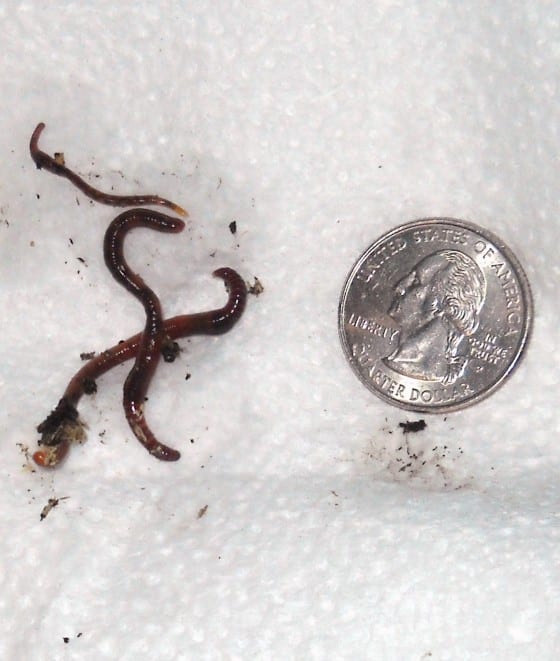Start Composting with Worms
Vermicomposting is a self-contained and modified alternative or addition to traditional outdoor composting. It consists of using small worms and basic vegetarian kitchen waste such as: banana peels, wilted lettuce, potato clippings, apple cores, melon rinds etc. as “food” for the worms to break down into compost. Worm composting can be done year round inside […]

Red wiggler worms are perfect for composting.
Photo Credit : Shelley Wigglesworth
Photo Credit : Shelley Wigglesworth
Directions for composting with worms:
What you will need: Opaque plastic tub with a lid, two parts of untreated potting soil to one part of shredded newspaper along with a handful of vermiculite and a handful of worms. How to do it: Drill approximately twelve to fifteen holes in the bottom, top and sides of a plastic storage bin. (worm bins may be constructed as small or as large as the worm farmer desires) for aeration. Add two parts of untreated potting soil to one part of shredded newspaper along with a handful of vermiculite. Mix thoroughly. Do not fill worm bedding higher than mid-level of the bin as you will need room to cover and add to the scraps. Add a handful of vegetable kitchen scraps and a handful of “red wigglers” cover and check on every few days to see if the worms are congregating toward the food source and breaking it down. With in a few weeks worms will begin propagating. Troubleshooting: Over or underfeeding the worms. Overfeeding: If there is any foul odor, mold growing, or if the bedding is soaking wet, you have overloaded the bin with food and the worms cannot keep up with it. Solution: Check to see if worms are alive (they can drown if it’s too wet), and if they are, remove some of the food source, add shredded newspaper and soil to absorb excess moisture and keep the lid off the bin for a few days. Underfeeding: If the soil is dry and crumbly and the worm count is low or if the worms are lethargic or dry, they are in need of food. Solution: add more food scraps and cover the bin. Fruit Flies: If fruit flies appear, make sure the food source is buried in soil and that the worms are breaking it down in a timely fashion. Harvesting: Every few months you will need to add new bedding, and harvest the compost. The easiest way to do this is to move all the food sources to one small corner of the bin and wait a few days. Eventually all of the worms will gravitate to the food source. Remove the compost that is left behind and replace with fresh bedding. If you decide to stop composting, simply dump your bin and compost material into a garden or outdoor bin. Learn more about the benefits of composting.Shelley Wigglesworth
Shelley (Fleming) Wigglesworth is an award-winning freelance journalist from Maine and a certified Maine Master Gardener who writes gardening articles on a regular basis for NewEngland.com. Her work can be found in the following publications: The Village Magazine, York County Coast Star, Yankee Magazine (online), National Fisherman Magazine, Commercial Fisheries News, Points East Magazine, Coastal Angler Magazine and The Maine Lobstermen's Association's "Landings."
More by Shelley Wigglesworth

